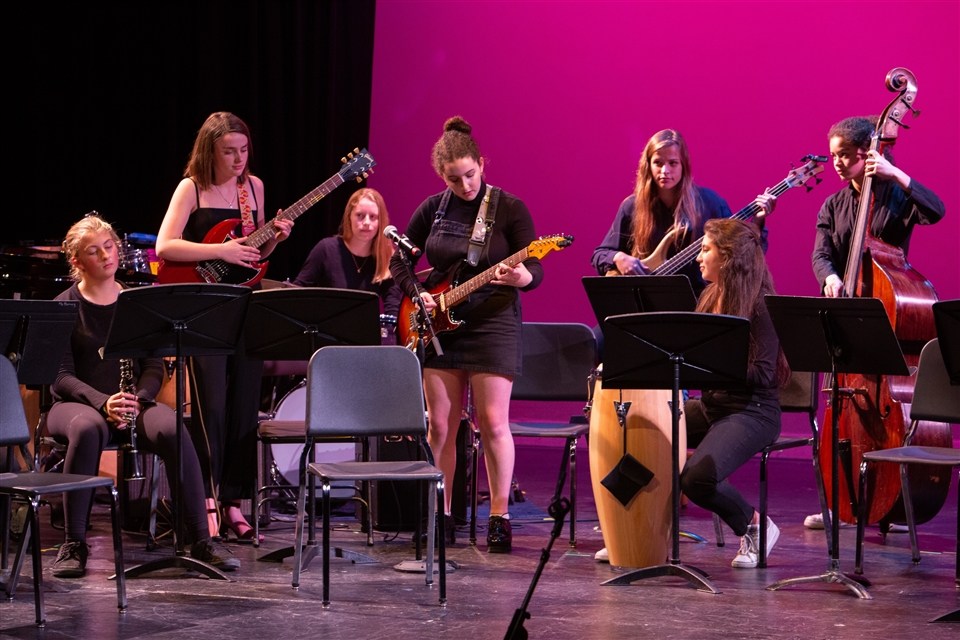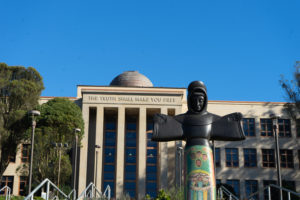On the afternoon of November 30, 2017, Nora Hylton ‘20 and Annabelle Hendrickson ‘19, pulled up to St. Anthony’s Soup Kitchen to perform as a part of Lick’s “Advanced Combo” jazz ensemble. A technician helped to unload their instruments from the truck. He turned to them as he put two trumpets and a tenor sax on the curbside; “So, you guys are the vocalists?” The girls, annoyed, told him that those, in fact, were their instruments, and they were on deck to perform a set for the people dining at St. Anthony’s.
Comments like the jazz technician’s are the reason Hendrickson — with the guidance of music department director and club advisor Martha Stoddard — started Female Instrumentalists Never Ending (F.I.N.E) in the fall of 2018. The club’s mission is to “provide an empowering space where female-identifying instrumentalists of all experience levels can learn, play, and create music together.”
F.I.N.E was born out of an all-female Advanced Combo performance in the 2017 fall jazz concert; when a small ensemble including Hylton, Hendrickson, Maya John ‘18, Ruby Landau Pincus ‘18, and Chloe Davis ‘21 split off to perform “Ms. BC” by Pamela Watson, an effort to highlight the often-overlooked work of female composers and instrumentalists.
That performance jump-started F.I.N.E’s resume, and pushed Hendrickson to create an official club. Six months in, they’re now a rock-solid ten member jazz ensemble (Sedi-Anne Blanchford ‘22, Gabrielle Begun ‘21, Juliana Lamm-Perez ‘21, Mira Larrance ‘20, Hannah Levenberg ‘21, Emma Shaw ‘21, and Julia Shaw ‘21). They even showcased one of Hendrickson’s original compositions at Girl Talk, a piece about the male dominated culture of jazz called the Musicogynist’s Blues. “It didn’t have [lyrics], it was just the vibe,” Hendrickson said. The song addressed the inevitable tension when strong female musicians enter male-dominated spaces.
The history of jazz doesn’t make much room for women, especially as instrumentals go. Vocalist icons like Ella Fitzgerald, Nina Simone, and Bessie Smith are households names even decades after their heyday, but most female instrumentalists are overlooked or long forgotten. “The history of jazz is peppered with women who sing. That was your way to get on the stage: voice, looks, persona, and a back-up band full of guys… So if you are an instrumentalist, where are your role models?” Stoddard says. Even today, it took persistent lobbying from women’s advocacy groups to convince the ‘Jazz at Lincoln Center Orchestra’ to revamp hiring policies to ensure gender equity. In an effort to combat these stereotypes, F.I.N.E. chose to be an instrumental-only ensemble. They also focus on performing the work of female composers, a demographic seldom displayed in the male-dominated sphere of music production.
Lick’s Advanced Combo is eighteen percent female, and the class dynamic doesn’t always lend itself to gender inclusivity. “Learning in spaces dominated by men can be kind of scary… if I say ‘I don’t know how to do this,’ people are like ‘Why is she even here?’” Hylton says. However, F.I.N.E.’s leaders emphasized that the club was was created as tool to empower female instrumentalists to take the spotlight, not to criticize their male peers.
Stoddard, who is in charge of all instrumental music at Lick, said she “[doesn’t] think it’s the boys’ fault… it’s a blind spot.” “Perception of skill,” as Stoddard puts it, often overshadows skill itself in music classes. Women have been socialized to take a backseat in minority-female settings, and consequently see themselves as less competent, even when they are equally or more skilled than their male counterparts. This can be especially true for jazz, as the music lends itself to high-judgement risk taking like improvisation. F.I.N.E. is striving to combat the intimidating dynamic through all-female collaboration. After a moving performance at Girl Talk, Gabrielle Begun ‘21 reflected that she finally felt like “a guitarist, and not just a girl in the band.”
Although F.I.N.E’s core group originally came together through Advanced Combo, they have since begun to bridge the gap between high level ensembles and jazz newcomers. Joining a majority-male music class as a freshman can feel intimidating and isolating — no matter your skill level. F.I.N.E. is committed to accessibility by encouraging any girls who are interested to join, even if they don’t feel comfortable signing up for Lick’s more formal music program. As Begun puts it: We are all just jamming, as women.”







